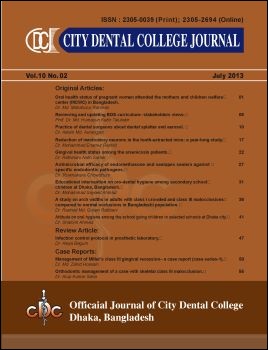Reduction of Masticatory Neurons in the Tooth-extracted Mice: A Year-long Study
DOI:
https://doi.org/10.3329/cdcj.v10i2.16315Keywords:
Masticatory neurons, periodontal mechano receptors (PMR), sensory input, tooth-extracted mice, trigeminal mesencephalic nucleus (Me5), trigeminal ganglion (TG) and trigeminal sensory nuclear complex (TSNC)Abstract
Background: It has been reported that the number of masticatory motor and sensory neurons were seriously diminished and the masseter muscles were severely atrophied in the genetically mutant osteopetrotic (op/op) mouse with no eruption of teeth and less-developed periodontal ligaments. The present study was designed to observe whether the sensory input from the periodontal mechanoreceptive afferents be involved in the development and maintenance of the masticatory system.
Methods: A case-control study was carried out with 2 groups of male ICR mice. Unilateral extraction of upper and lower molars was carried out in the case group on day 20 after birth. For assessing effects of tooth loss on the masticatory neurons, both mice groups were sacrificed on days 30, 60, 90, 120, 180 and 360 after birth and the trigeminal mesencephalic neurons (Me5) and trigeminal ganglion (TG) were traced and counted on both sides of the central nervous System (CNS).
Results: In case group, severe degeneration of the ipsilateral inferior alveolar nerve (IAN) was observed on as early as day 40 after birth and there was significant decrease in the number of labeled Me5 and TG neurons between 60th and 360th postnatal days on the tooth-extracted side. Labeled primary afferent terminals were also severely diminished in the trigeminal sensory nuclear complex (TSNC) on the tooth-extracted side.
Conclusion: Present study suggests that the decrease in the sensory input due to the tooth loss causes the disorder of the development and maintenance of the masticatory system even in the normal animal.
DOI: http://dx.doi.org/10.3329/cdcj.v10i2.16315
City Dent. Coll. J Volume-10, Number-2, July-2013
Downloads
260
265

